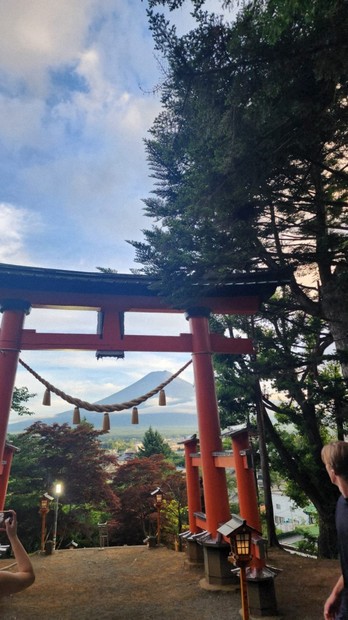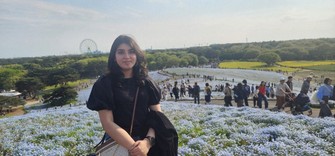
Mount Fuji is seen from Enoshima Island. The writer says she had not expected to see the mountain but it was a welcome surprise as dusk came, and a fond memory from her time abroad.
When I left home for my study abroad semester, I expected to experience a defining moment, something intense and transformative, as many exchange students often imagine. I thought it would be something grand or unforgettable, something that would change my perspective forever. What I didn’t expect was for that moment to come in the form of a struggle with Japan’s common lottery-based course registration system.
Having grown up with Canada’s first-come, first-served approach to university course registration, I was initially surprised, and admittedly frustrated, when I was denied a spot in a class. This was not because I was late or unqualified, but simply because my name hadn’t been drawn in the random selection.
Back home, course registration can feel like a competitive sport. There have been numerous instances where I have found myself at daybreak with a cup of coffee, urgently refreshing my computer before course selection as my home institution began for the upcoming semester. It’s a race against the clock, and success often depends on speed, planning, and internet strength.
So when I found myself on the losing end of Japan’s course lottery, I instinctively reached out to academic advisors in Canada, unsure of how to proceed as I had suddenly been denied a course deemed necessary back home. This was, undoubtedly, mentally taxing. But as my initial frustration and stress wore off, I began to reflect on the intent behind this unfamiliar system.
While the Canadian system can give an edge to students with faster internet connections or better preparation, Japan’s lottery eliminates those advantages, offering a more equal starting point for everyone.

Mount Fuji is seen through a torii gate in the Lake Kawaguchi area. The photo was taken when the writer was with friends near the end of her study abroad journey.
I think the equality of the lottery system reflects deeper values that shape Japanese society, and this includes a strong respect for harmony, fairness, and responsibility. In contrast, Canada’s system, while efficient, tends to emphasize individualistic drive and competition. While both models have their advantages, Japan’s method certainly prompted me to consider how systems are built not just to function, but to possibly also reflect a nation’s values.
Thus, what began as a frustrating registration fumble became a significant lesson in cultural learning. I discovered something broader than simple scheduling logistics. I found an underlying yet powerful respect for equality and community-driven approaches, even when inconvenient, woven into everyday life in Japan. I could see the fairness through the lottery-based system, and emphasis on personal responsibility through the inability to drop classes.
As the semester unfolded, I began to notice similar values illustrated in other aspects of Japanese society. I saw the manner in which commuters would stand to a single side of the escalator to give space to those who needed to rush up it. I witnessed the unspoken etiquette of public spaces, the patience during unexpected delays, and the overall emphasis on social harmony in daily life.
Studying in Japan hasn’t just broadened my academic knowledge; it has reshaped my understanding on the importance of community. And though I will soon return to Canada and the refresh-based registration system I am used to, I’ll carry with me a quieter lesson which was learned not in the classroom or on a trip, but in the small space between educational systems.
(By Zoha Naqvi)

Zoha Naqvi
Profile:
Born in Ontario, Canada, Zoha Naqvi is a student from McMaster University. At a young age, she developed a deep interest in the arts and geological formations, leading to her desire to travel to Japan and immerse herself in the country. Zoha enjoys topics regarding global justice and political philosophy. She attended Waseda University on her exchange abroad semester between March and August 2025.
(This is Pt. 4 of a series. Subsequent parts will be published intermittently.)


AloJapan.com